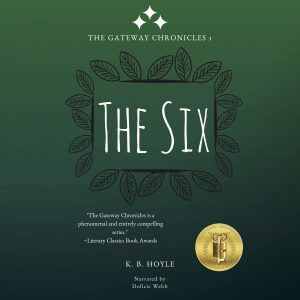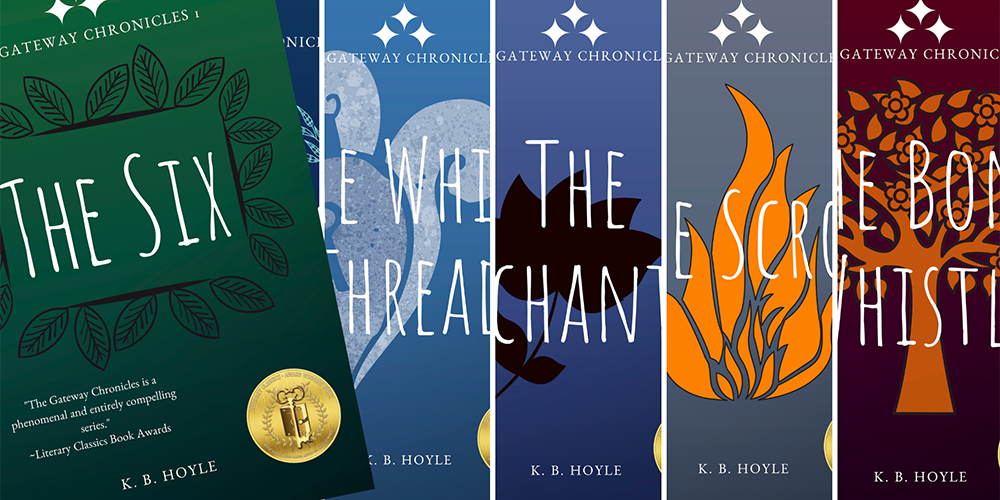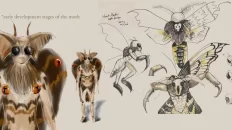When picturing an epic fiction series, who is standing at the helm—the conquering hero who will slay the evil of the world and restore the light? Perhaps a vision of Aragorn leading the charge in the Lord of the Rings, or Harry Potter facing the Dark Lord comes to mind. If I add female to the question, is it a proud, “lost” princess such as the Mother of Dragons, or Katniss Everdeen fiercely claiming her little sister’s place?

K.B. Hoyle challenges the old narrative (no matter how wonderful the above stories are) by turning the usual lead roles on their head in her six-book epic fantasy, The Gateway Chronicles. She has a mighty king in her tale, yet when we first meet him, he is ten years old and has lived his entire life in hiding. Years pass before he regains his throne and fulfills his blood-given role, and still the day is not his to save.
Instead, Hoyle gives the leading role to a strange, lonely girl from a strange land who was born just a little bit different from everyone else. In a world in which Young Adult fiction seems fixated on dark, twisty tales for an audience of 16+, Darcy Pennington’s story is a much-needed breath of fresh air. When the story begins, she is a quiet, introverted, snarky, selfish, judgmental, hopeful, longing, imaginative, brave thirteen year old who is desperate to feel understood. In short, she is everything a young teenage girl is at heart.
I respect Hoyle tremendously for this storytelling decision. It takes guts and skill to write teenagers in a way that is respectful, honest, teasing, and yet sympathetic—yet that’s exactly what she does with these books. The characters start young and many of their worst traits are left to run unchecked for years as they grow and develop, leaving us with beautiful, sweeping character arcs for not only Darcy, but every other main character in the cast. They make mistakes, reap the consequences, then make them again before finally learning their lessons and moving forward. Darcy, especially, faces pitfalls with secrecy and self-isolation time and again, yet she eventually learns to actively fight against them or, in other cases, harness their attributes and use them for something good.
Another hallmark of Hoyle’s writing is the way her characters take active roles within their stories, and this introduces a sort of paradox within the series. The questions of prophecies in literature, or preordained actions, have been debated since the dawn of fiction. Are prophecies worth their salt, or are they just self-fulfilling? Do they foretell the events that will happen, or force those events into play? Hoyle tackles these questions in a brilliant way, most especially by having Darcy (who was scripted to marry the king) constantly take an active role in her own narrative through the series—first by means one might call foolish and reckless, and later in a series of well-calculated, courageous, and wise moves. That said, she need not have worried so much about her role, because as with a good caramel, it gains depth and richness over the passage of time (with a fair bit of heat thrown at it in the interim).
In one of my favorite quotes, Rubidius (the sage, grumpy master magician and royal advisor who becomes Darcy’s mentor) puts it quite plainly when he says, “Youth is so myopic.” A lack of foresight, or in some cases an overabundance of it, causes some of the main conflict within the narrative—and most especially with the relationships. And The Gateway Chronicles is a story that hinges sharply on relationships. The most notable of these are Darcy’s relationships to Samantha Palm, Rubidius, Colin Mackaby, and Tellius Ecclektos. While other relationships of various natures (deep friendship, opposition, romance) play important roles, the story itself and the very fate of the world hinges on the aforementioned four.
Sam, Darcy’s scripted “companion”, does not start out as her best friend. In fact, the first book is largely about Darcy’s avoidance of her offered friendship. They are opposites in nearly every way, yet Sam becomes not only Darcy’s emotional support, but the steady hand of kindness, wisdom, tough love, and even protection in many spaces throughout the books. When they are apart or one has forsaken the other, chaos ensues. Rubidius, on the other hand, is a cantankerous sage of a man who has very little patience for Darcy in the beginning. Given time, trials, error, and humility on both their ends, Rubidius becomes a fitting mentor to Darcy and learns to not only respect her, but to care for her and offer advice and aid as often as he can.
Colin Mackaby, on the other hand, has an infinitely more complicated relationship to Darcy as her foil. To Colin, Darcy is unattainable salvation wrapped in a pretty package sent to mock him with her empathy and repeated attempts to show him a better path. To Darcy, Colin is a wounded creature in need of care, a cause not yet lost. Still, their independent paths bear a striking and at times painful resemblance to one another: two oddities who don’t quite belong to their birth worlds, both enticed by the dark and powerful Tselloch into claiming their “higher purpose” and false crown. The difference lies in their ultimate choices.
Choice leads us, at last, to Tellius and Darcy. Theirs is a dynamic, complicated, joyful, sorrowful, simmering, lasting romance that, at first, looked nothing like one. The question of prophecies focuses tightly on Darcy and Tellius when their very first meeting falls under the shadow of a foretold marriage, and the inherent conflict creates massive frustrations and complications leading to entire, madcap journeys devoted to their attempts to circumvent this fate. The greatest irony of the series comes when, after years of questioning the prophecy and avoiding their pending marriage, they choose one another after all. Within their relationship—from foes to friends to fiances—Hoyle gives us a marriage of contraries (literally and metaphorically). One will always be stronger with the other present, and things go wildly wrong when their relationship is strained or one is absent from the other. As they struggle to find a balance in power, learn to respect one another’s abilities and find individuality in the midst of their union, readers get a gorgeous, realistic look at a powerful team of compelling individuals who truly make one another better and live selflessly for the other. They are the heroes we all have been waiting for.

Selflessness and selfishness. This is what the central conflict of the entire series boils down to. It is seen on a mass scale in the two sources of power within the world—Pateros who is the benevolent creator of the world and Tselloch, the great and invading Shadow bent on dominating Alitheia and its inhabitants. On a much closer scale, it is seen when Darcy fights her way from selfishness and constantly seeks selflessness throughout the series. The overarching theme can best be seen in this, my favorite line of the series: “There is no greater exchange, no more powerful magic, than to give of one’s life so others may live.” Time and again this becomes the central thread linking one novel to the next, and what a fitting theme it is.
Hoyle did not simply put words to a page, she told a story that matters. The Gateway Chronicles, above all, is a transformative story—of the characters, the world of Alitheia, and even the audience who reads it. In the words so often quoted on the internet, one does not simply read The Gateway Chronicles and move on with one’s life. When you read these books, they will linger in your heart, the back of your mind, in the patterns on the trees outside and on that little gust of wind. The characters become real, and you might suddenly believe in magic again and possibility and the simple complexity of hope. My heart longs for Alitheia and when I set down The Bone Whistle (the last book of the series), it takes everything in me not to pick The Six right back up again. I leave it to you, then, to start the journey fresh and immerse yourself in a world you will never forget.








